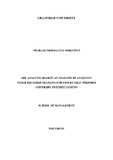JavaScript is disabled for your browser. Some features of this site may not work without it.
| dc.contributor.advisor | Taffler, Richard | en_UK |
| dc.contributor.author | Mokoaleli-Mokoteli, Thabang | en_UK |
| dc.date.accessioned | 2005-11-23T11:34:14Z | |
| dc.date.available | 2005-11-23T11:34:14Z | |
| dc.date.issued | 2005-09 | en_UK |
| dc.identifier.uri | http://hdl.handle.net/1826/934 | |
| dc.description.abstract | The finance literature suggests that analysts’ stock recommendations have negligible impact on market prices. Some studies suggest this lack of market impact may be partly driven by the affiliations between investment banks and the firms their brokerage arms cover (conflicts of interest). However, most of these studies fail to take into account other factors including institutional and trading issues and psychological biases which may well be just as important in influencing analysts when they gather, process and interpret information about stocks. The aim of the current study is to establish the factors which are associated with analysts issuing stock recommendations that lack market impact. I find that nonconforming analysts’ stock recommendations are associated with overconfidence bias (as measured by optimism in the language they use) and representativeness bias (as measured by previous stock price performance, market capitalisation, book-to-market and change in target price). Thus, stocks that receive a buy rating and subsequently underperform the respective benchmark are associated with a high level of optimism in the tone of the language used by analysts in their investment reports that they prepare to justify their recommendations, have positive previous price momentum, have large market capitalisation, have low book-to-market ratio and have their target prices changed in the same direction as the stock recommendation. Not surprisingly, there is also a relationship between the investment bank issuing the recommendation and the firm. In addition, stocks that are awarded sell rating and subsequently outperform the benchmark have characteristics opposite to those of nonconforming buys. Finding that potential conflicts of interest significantly predict analysts’ nonconforming stock recommendations supports recent policy-makers’ and investors’ allegations that analysts’ recommendations are driven by the incentives they derive from investment banking deals. These allegations have led to implementation of rules governing analysts’ and brokerage houses’ behaviours. However, finding that cognitive biases play a major role in the type of recommendation issued suggests that these rules may work only in as far as regulating conflicts of interest, but will have a limited role in regulating psychological bias, as my results suggest that analyst bias is inherent in their work. Surveys of what fund managers expect of analysts indicate low rankings of analysts’ investment advice as manifested in their recommendations (e.g., All-America Research Team Survey 2002). My results further indicate that fund manager concern is likely to continue because not all behavioural factors in analyst stock recommendations can be controlled. | en_UK |
| dc.format.extent | 1944 bytes | |
| dc.format.extent | 764771 bytes | |
| dc.format.mimetype | text/plain | |
| dc.format.mimetype | application/pdf | |
| dc.language.iso | en_UK | |
| dc.publisher | Cranfield University | en_UK |
| dc.title | Are analysts biased? an analysis of analysts’ stock recommendations for stocks that perform contrary to expectations | en_UK |
| dc.type | Thesis or dissertation | en_UK |
| dc.type.qualificationlevel | Doctoral | |
| dc.type.qualificationname | PhD | |
| dc.publisher.department | School of Management |
